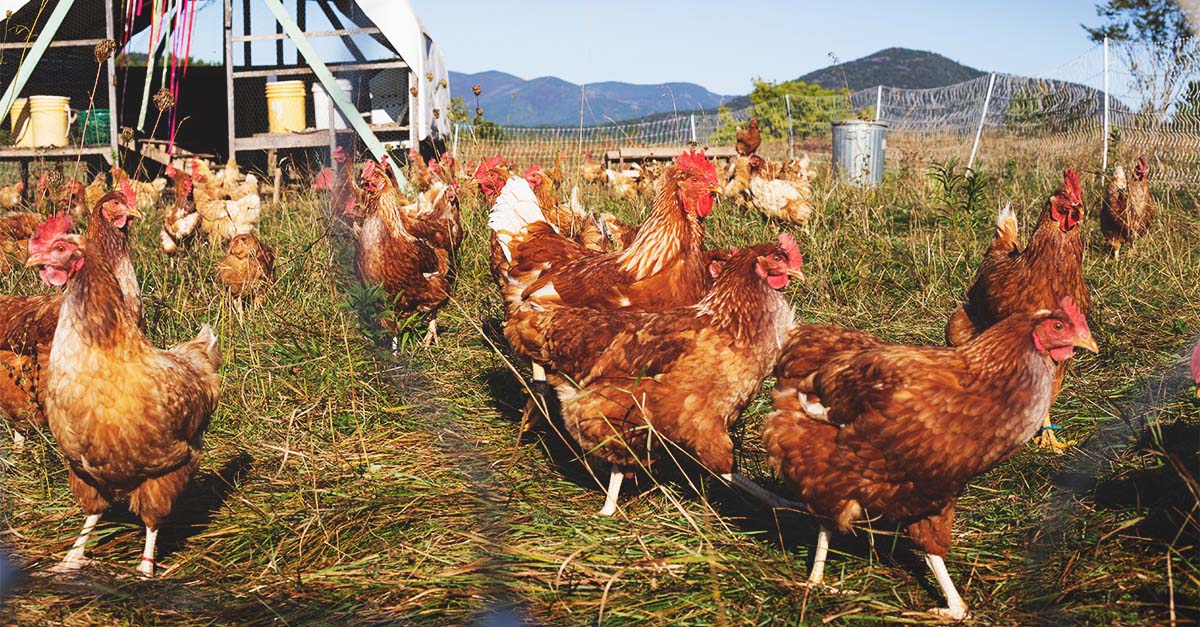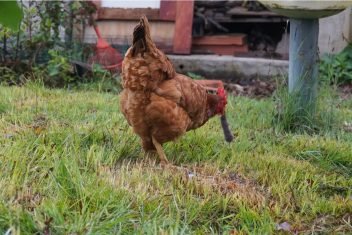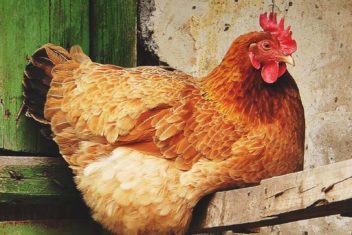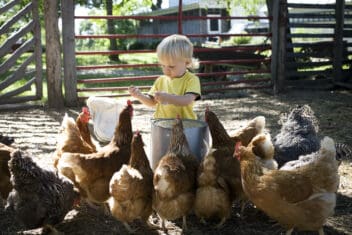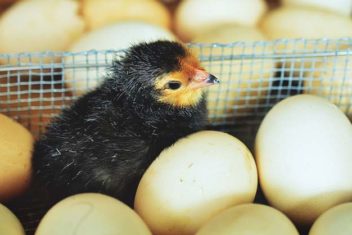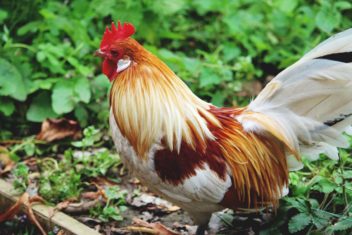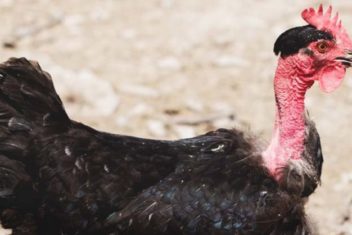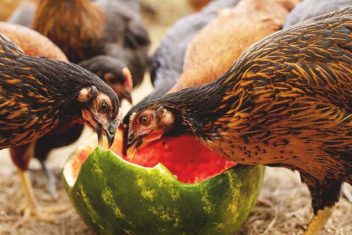Raising chickens is a lot like raising children. It’s not enough to simply remember to feed them and provide them with plenty of water – you also need to go out of your way to provide a nurturing environment that will help them grow and thrive, too.
I won’t make light of the situation – I know the two are very different, and that comment is made mostly in jest!
However, like kids, chickens sometimes have a tendency to bully each other. While it’s easy to explain to a young child why it’s important to be nice to others, it’s not always quite so simple with your backyard flock.
In this article, I’ll tell you all about why chickens bully each other – and how you can put a stop to it for good. Don’t worry – no time-outs required.
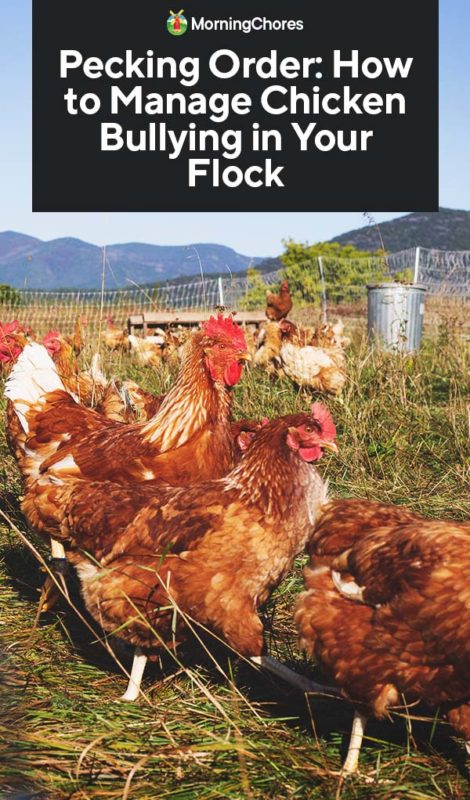
The Pecking Order
In most cases, chickens are aggressive to each other because they have a desire to establish the pecking order. Although the pecking order isn’t always at the root of chicken aggression, it is often to blame for minor issues of violence in your flock.
The pecking order is a complicated relationship structure that exists in every flock of chickens, large and small, no matter what breed. It is determined by a variety of factors including age, personality, breed, and size.
Generally, a hen or rooster who wishes to be at the top of the pecking order will be aggressive and assertive toward the other members of the flock. He or she will challenge shyer, more timid birds and gradually rise through the ranks.
When you first introduce a new chicken to your flock, she is naturally going to be at the very bottom of the pecking order. This position sometimes remains no matter what, but some hens push their way up through the ranks regardless.
Viewed from the outside, watching chickens establish the pecking order might seem like chicken bullying or violent behavior. As humans, we have a tendency to personify our chickens and think that they are ganging up on each other for no reason.
In most cases, you should not interfere with the pecking order. These position-establishing behaviors are usually short-lived and you don’t need to worry about any long term damage to any one member of your flock.
If, however, the behavior is sustained and has begun to seriously threaten the wellbeing of one of your birds, that’s behavior that can no longer be considered part of the pecking order – that’s chicken bullying.
What Causes Chicken Bullying?
Caption: This hen is at the very top of our flock’s pecking order.
There are many factors besides the pecking order that can cause chickens to lash out at each other. Luckily, most of them are easily remedied. Here are some of the most common culprits:
1. Stress
Chickens like to have established routines (yes, just like children!). If anything leads them astray, they may become stressed. This could include something as minor as a change in feed or as major as predators lurking nearby.
Your birds might also feel stressed when another flock mate dies or there is illness going around. Even if your birds aren’t directly affected by some ailments, such as mites, they may pick up on the energies of the rest of the flock and respond accordingly.
Do your best to mitigate stress in your flock. Not only can it lead to violent behavior, but it can also cause a lapse in laying and a delay in growth, too.
2. Overcrowding
Caption: Putting your chickens in mobile chicken tractors can alleviate serious issues of bullying.
By far, overcrowding is one of the most common causes of chicken bullying in a flock. Overcrowding can lead to all the other issues we will mention in this article, plus it’s a danger to your birds on its own.
Be careful with the number of chickens you raise – I know that it’s easy to get carried away and think, “one more won’t hurt!” However, it’s important that you maintain a minimum of 4 square feet per bird in the coop and at least 8 in the run.
Chicken tractors, or mobile chicken pens, can help reduce aggression because they will give your chickens access to fresh pasture every single day. They will constantly have new food, bugs, and areas to explore.
3. Boredom
Boredom is another common factor in aggressive chickens. Most common during the winter months, when your birds can’t go outside to forage, aggressive behaviors like feather picking tend to occur.
This might start out small, with just a pulled feather here or there, but you need to be vigilant for signs of a more serious issue. This can easily turn into frenzied pecking and even cannibalism if left unresolved. A hen who is frequently harassed by the other birds may stop going near the other chickens and may be resistant to go into the coop at night, too.
4. Sickness
Chickens are instinctual beings, and they know when one of their flockmates is sick. In the wild, this would lead to the ill bird being driven from the flock, as it becomes a liability.
Unfortunately, these natural instincts don’t go away just because you’ve decided to domesticate your birds in a cute little coop. Chickens often peck and bully flock mates because they can tell that they are ill.
5. Broodiness
Broodiness is a common issue that can cause aggression – luckily, it’s usually pretty short-lived. When a hen is broody, she will sit on her eggs all day until they hatch – which takes 21 days. Many hens go through this during their lives, although some never will. Some hens go broody without even having eggs to sit on, or they stay broody even though their eggs are not fertile.
A broody hen will be nasty to you and to anyone else who comes near her nest. She will bite, attack, and peck anybody who attempts to get close to her eggs. If your hen is acting aggressive because she is broody, you will be better off trying to get her through this period of her life before you do anything else.
6. Breed
Some chickens are naturally more territorial than others – and it’s not always related to size. Some small breeds like Orpingtons and Australorps are incredibly laidback, while others, like Rhode Island Red and Delawares, are quite territorial.
How to Prevent and Stop Bullying Behavior Among Chickens
Chicken bullying might be distressing to witness, but luckily, there’s a lot that you can do as a chicken keeper to help alleviate its causes and symptoms.
1. Remove Triggers
For starters, keep a close eye on your flock. Often, situations of bullying grow out of hand before you’ve even realized there’s a problem. Check your birds each day for signs of bullying, like pulled feathers or raw spots.
2. Space Things Out
Caption: Make sure you have enough nest boxes for all of your chickens.
It’s also a good idea to evaluate the ways in which you can give your chickens more room. Even if the cause of bullying isn’t overcrowding, many issues that lead to bullying can be calmed by providing your birds more space.
Chickens are like people in that they don’t like to be crowded – see if you can remove some triggers for bullying by spreading your flock out a little bit more.
In the winter, that might mean shoveling a bit more space for your birds outside. Even if your chickens can only get outside for a brief spell, that will be better than keeping them cooped up.
Don’t forget that more space means more facilities, too – such as nesting boxes. Make sure you have at least one nest box for every three to four birds.
Remember that not all birds are alike when it comes to how much space they need, either. Some large breeds, like Jersey Giants and Orpingtons, need a ton of space – aim for a minimum of five square feet inside. Other breeds you will need to provide extra space for include Appenzellers, Anconas, Cornish Crosses, and Rhode Island Reds.
3. Add Entertainment
Adding some boredom busters can really cut down on bullying within your flock. You can alleviate boredom with homemade toys like blocks of frozen zucchini for them to peck at or you can make a tetherball out of a cabbage. There are even store-bought toys you can buy, too.
Scratch is a godsend for many chicken keepers. Not only does it help fight boredom, but it also adds additional calories to your birds’ diets during the winter months. This will keep your birds well-fed and happy, reducing boredom while also diminishing the likelihood of disease. Throw a few handfuls down each day to get their minds off bullying each other.
4. Isolate the Bullies or the Victims
I always recommend isolating your bully chicken instead of the victim if you have to pull one member of the flock out of the coop. Unless your victim is seriously injured to the point where she needs medical attention, try to remove the bully.
Why? The logic is simple. If a chicken is being bullied, it’s likely because she is low in the pecking order. Remove her, and when you allow her to rejoin the flock, she is going to be even lower. This could make matters worse.
In most cases, it’s best to isolate the bully – if you can figure out who she is. Remove her from the flock for a few days and when you add her back, she will likely have lost her place at the top of the pecking order.
5. Consider Your Lighting
Red light is soothing for a chicken, helping to make it less aggressive toward other birds. If you have a chicken that is consistently bullying other members of the flock, try swapping out your white light bulbs for red ones. This can work even if you don’t already have lighting in your coop.
6. Add More Feeders or Waterers
Caption: Adding more feeders can help reduce fighting in the flock.
Make sure you have plenty of feeders and waterers to go around. Bullying can often be exacerbated by a lack of access to food and water. In addition, if a chicken is being harassed by its flockmates, it might be more hesitant to approach feeding stations.
7. Be Mindful of Introducing New Birds
It’s almost impossible to have a flock of chickens and never need to add new birds – after all, a chicken can only produce so many eggs before it needs to be replaced.
However, the problem with introducing new chickens is that the old birds will be territorial. The new pecking order will need to be established, introducing some challenges when you add new birds to a flock.
When you add new birds, never add just one single chicken to the flock – there’s safety in numbers. You also need to be very careful about adding new roosters if you already have one in the flock, as they will fight to the death in many cases.
Adding new chickens at night or during molting periods, when the rest of the flock is already more vulnerable, can be a good way to do things.
8. Rehome
Sometimes, the only viable way to stop a bad case of bullying in your flock is to rehome the offenders. Other people will suggest getting rid of the victim of bullying, but this can truly go either way. If you have a hen that is constantly picking on other birds, removing just one victim isn’t going to alleviate the problem – you need to get rid of the perpetrator.
Temporarily isolating the victim or offender can help put a bandage on the bullying situation, but if you reintroduce your birds and notice there is still fighting, you need a permanent solution. Either rehome the offending or offended chicken to a new farm, or find a place for him to her in the soup pot.
When to Intervene
In most cases, you don’t need to do anything if your chickens are being a bit ornery toward each other. Often, these behaviors are temporary and can be alleviating with quick fixes such as providing them with more room to roam.
However, if it seems like your chickens have been fighting forever with no resolution – and the pecking order should have long ago been established – it might be time to step in. This is particularly true if any chickens have been injured or killed by the fighting – once one bird is killed, it will turn into a domino effect with the rest of the flock, too.
